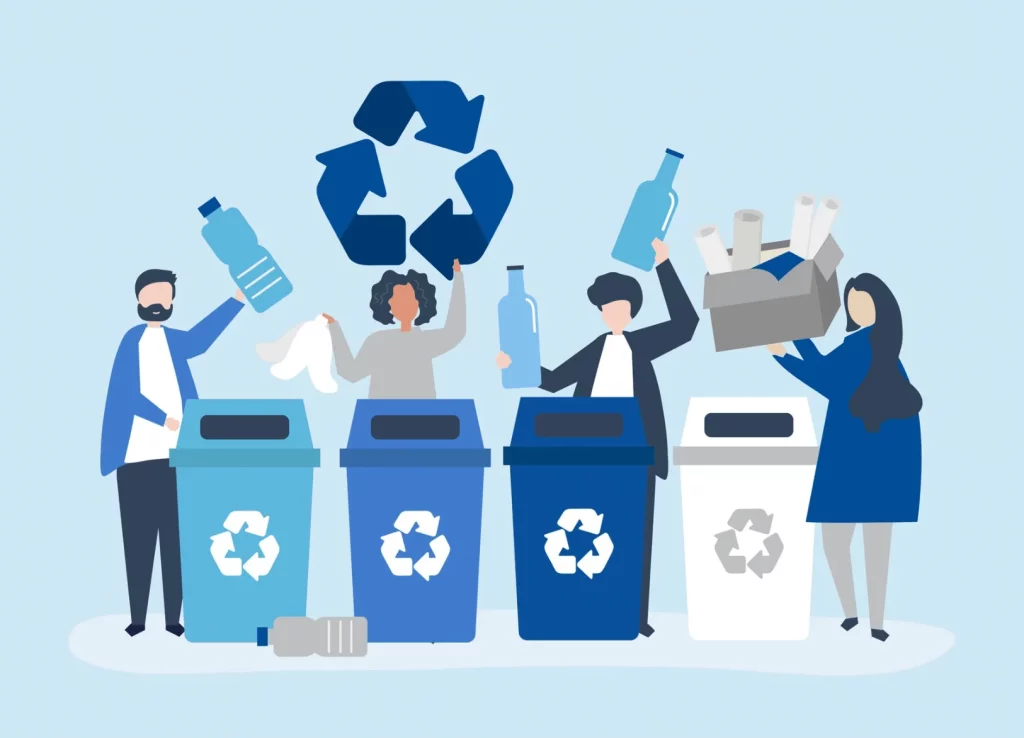Managing waste in businesses in 2024 is a strategic and environmental necessity to:
- minimize ecological impact,
- and optimize operational costs.
Our guide offers practical solutions to assist you! By understanding each employee’s responsibilities and adhering to legal standards, your company will enhance its brand image, save costs, and actively contribute to reducing its environmental footprint.
- Waste Management: A Recap
- Why is waste management important in business?
- What are the steps in waste management in business?
- How can waste management be improved in a business?
- Regulations for waste management in business
- Available solutions and services for waste management in business
Waste Management: A Recap
What is waste management?
According to Wikipedia, “waste management includes the collection, trading and brokerage, transportation, treatment, reuse or disposal of waste, usually those from human activities.” It involves the management of all your company’s waste from sorting bins to valorization or disposal.
Who manages waste in a business?
The responsibility for waste management lies with all employees within a company. From the CEO to the basic employees, each has a role in waste reduction, selective collection, and treatment. Interdepartmental collaboration is essential to establish a sustainability-focused corporate culture.
Employee awareness is fundamental. Every employee must understand the importance of waste sorting and adopt environmentally friendly practices. Personalized awareness programs can be implemented to
A clear hierarchy of responsibilities is also essential. Designating a dedicated manager to oversee the entire process, from collection to final disposal, can ensure more efficient waste management. Consultation services are available to help companies establish a waste management structure tailored to their size and specific needs.
Why is waste management important in business?
- Compliance with legal standards
The primary reason waste management in business is crucial lies in complying with current legal standards. Environmental regulations require companies to dispose of their waste responsibly, thus avoiding costly legal consequences.
- Brand image and social responsibility
Effective waste management enhances your company’s brand image by demonstrating its commitment to social responsibility. Today’s customers, increasingly sensitive to environmental issues, appreciate companies that adopt environmentally friendly practices.
- Cost savings
Proactive waste management can result in savings for your company. By reducing waste at the source, recycling, and adopting eco-efficient practices, you can minimize waste disposal costs and contribute to the preservation of natural resources.
- Reducing environmental footprint
By adopting sustainable waste management methods, your company can play an active role in reducing its environmental footprint. This often involves waste reduction, recycling, and the adoption of environmentally friendly technologies.

What are the steps in waste management in business?
Integrating an effective waste management strategy can not only strengthen your company’s sustainability but also generate economic benefits.
Let’s break down the key steps of this process.
Identification of types of waste generated
The first fundamental step in waste management in business is identifying the types of waste generated. This involves categorizing waste according to its nature, whether organic waste, recyclable waste, or hazardous waste. This classification allows for a better understanding of waste flows, thus facilitating the implementation of appropriate solutions.
Implementation of source separation system
The source of the problem is often the best place to solve it. Implementing a source separation system in your company encourages employees to separate waste at its source. By providing clearly labeled sorting bins and raising awareness among staff about the benefits of sorting, you significantly reduce waste contamination and optimize the subsequent management process.
Waste collection and disposal
Waste collection must be efficiently planned to ensure a continuous flow. Engage with reliable waste collection service providers that adhere to environmental standards. Waste disposal must also comply with current regulations. Ensure appropriate disposal methods are chosen, thus minimizing the environmental impact of your waste.
Optimize your waste recycling routes
to comply with the new regulation with our solution!
Waste valorization
Waste valorization is a key step in maximizing your company’s environmental efficiency. By promoting recycling, reuse, or transformation of waste into resources, you actively contribute to the preservation of natural resources and the reduction of the carbon footprint. Identify valorization opportunities specific to your industry to optimize this step.
How can waste management be improved in a business?
Optimization of internal processes
Improving waste management in a business starts with a thorough assessment of internal processes. Identify waste flows throughout the operational chain. Simplify and streamline these processes to reduce waste production at the source.
Reorganize workspaces to facilitate waste sorting. Well-placed recycling bins and clear signage can encourage staff to adopt good sorting practices.
Employee awareness and training
The success of effective waste management largely depends on employee awareness and training. Organize regular sessions to inform employees about the principles of selective sorting and the positive consequences of their involvement.
Make waste management an integral part of the corporate culture. Encourage individual responsibility by highlighting the positive impact each employee can have by adopting environmentally friendly behaviors in their daily lives.
Use of durable and eco-friendly products
Significant change in waste management also involves choosing durable and eco-friendly products. Opt for suppliers committed to environmentally friendly practices, thus promoting source reduction of waste.
Favor recyclable materials and consider alternatives to disposable packaging. Adopting durable products not only helps reduce waste but also strengthens your company’s eco-friendly image.

Regulations for waste management in business
Waste management in business is subject to strict legal framework. It promotes environmentally friendly practices. Understanding current regulations is essential for any business leader concerned about the sustainability of their operations.
Current laws and regulations
The first step to effective waste management in business is familiarizing yourself with the laws and regulations that govern this practice. In France, several texts govern this issue, including the Environmental Code.
Primary responsibility lies with the company, which must implement mechanisms for collecting, sorting, and properly disposing of waste generated by its activities. Precise standards vary by industry, but the common goal is to minimize environmental impact.
Sanctions for non-compliance with obligations
Failure to comply with waste management obligations can result in severe penalties for a company. The competent authorities ensure compliance with standards, and any breaches can lead to substantial fines or even legal action.
Feel free to consult our comprehensive article on the topic of bio-waste regulations.
Available solutions and services for waste management in business
Waste collection and disposal providers
When it comes to waste management in business, the first step is choosing the right waste collection and disposal provider. Opting for reliable partners tailored to the specific needs of your business is essential. These collection services, in collaboration with industry experts, ensure not only compliance with environmental standards but also optimization of waste disposal costs.
Innovative technologies for recycling and valorization
In an era focused on innovation, waste management in business now integrates cutting-edge technologies dedicated to waste recycling and valorization. Modern sorting and recycling solutions help minimize waste destined for landfill, thus promoting a more sustainable and economical approach.
Waste tracking and management tools
To ensure transparent and efficient waste management, the use of tracking and management tools is essential. These tools provide real-time visibility into waste flows, allowing business leaders to make informed decisions. By optimizing internal processes, these tools also help ensure compliance with constantly evolving environmental standards.
Whatever your industry, source separation applies!
Our experts support you in optimizing your waste recycling routes

